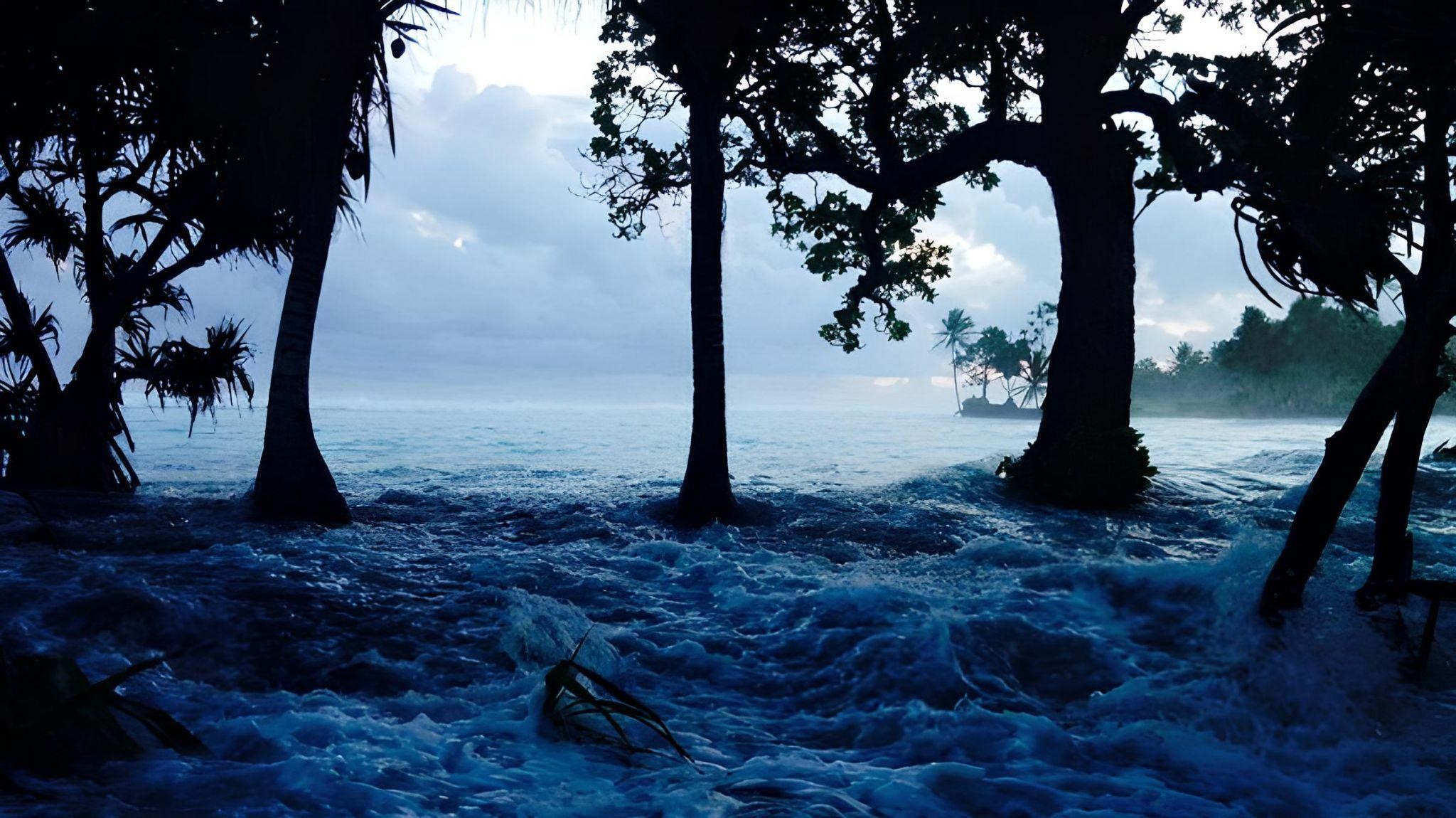
We often hear about global warming, the greenhouse effect, rising seas, without giving due weight to these phenomena. Living in the part of the world that depends on the whims of the fossil fuel magnates, we rejoice in recent months if man-made climate change causes longer summers and milder winters. At the antipodes, however, we are not so happy about these atmospheric upheavals. There are atolls whose islands are slowly disappearing, submerged by the seas.
Among the hardest hit islands is Tuvalu, a smile of white sand in the middle of the blue Pacific Ocean. Its flag contains nine yellow stars, one for each of the atolls that make up the tiny archipelago. Today, two of those islands are on the verge of being swallowed up by rising sea levels: the blame lies with the global climate crisis that has already caused irreversible damage and will probably make the nation uninhabitable in the coming decades[1]. At the UN conference (called COP26) on climate change[2] last November[3], Simon Kofe[4] , the foreign minister of Tuvalu, gave a speech while submerged in water. “Climate change and rising sea levels are deadly and existential threats to Tuvalu and the low-lying atoll countries,” Kofe said. “We are sinking!!!”[5].
The history of Tuvalu, and its beauty
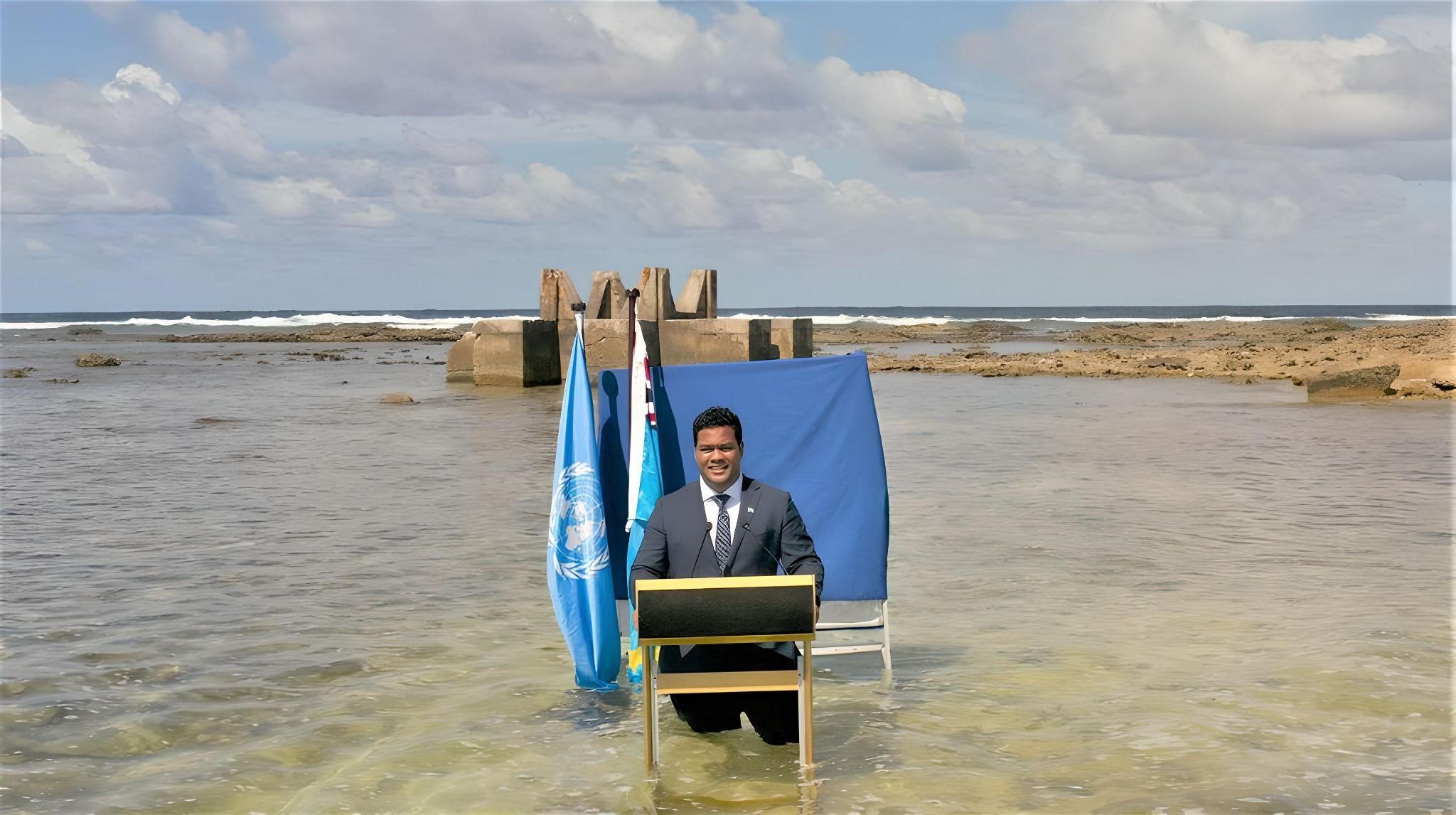
8 November 2021: Tuvalu’s Foreign Minister Simon Kofe makes a statement at COP26 immersed in the ocean[6]
Tuvalu is a microstate in the Polynesian region of the South Pacific Ocean[7]. It belongs to the continent of Oceania, halfway between Australia and Hawaii. The country consists of nine islands, six of which are atolls[8]. It is one of the world’s smallest and most remote nations, whose palm-fringed coral islands are located about two hours by plane north of Fiji. If you have heard of these islands, without having had the opportunity to visit them, it is probably because you are a collector of their stamps, which are highly prized by philatelists the world over[9].
It was thanks to the Europeans, who sailed to Tuvalu in the 16th century, that the island was included on the world map. However, it was the Polynesians who were the original occupants[10]. For most of the 19th century, western navigators referred to this archipelago as the ‘Lagoon Islands’, a name gradually supplanted by the ‘Ellice Islands’. The latter term became official in 1892, when Great Britain created the Protectorate, later the Colony, of the Gilbert and Ellice Islands[11]. Since 1877 the islands have been governed by Fiji[12].
In those years the inhabitants of Tuvalu were deported and made slaves, a practice called ‘blackbirding’. It is a term given to the trade to kidnap or deceive Pacific Islanders so that they could be taken to work sugar cane in Australia[13]. A genocide that, together with imported European diseases, reduced the population from 20,000 in 1850, to only 3,000 in 1875[14].
Inspired by the pseudo-scientific racial theories in vogue at the time, the colonial rationale for importing the islanders was that they were acclimatised to tropical conditions too demanding for white workers. Nobody cares about their health and safety, the white overseers exploit the islanders to death. Backbreaking work, heatstroke, disease, mistreatment and malnutrition kill the islanders by the thousands. After 1885, the wages of the dead are appropriated by the government to finance the deportation of their families. Denied work in the trade for which they were transported, excluded from whites-only unions, abandoned by missionaries and regarded as an unwelcome reminder of past mistakes by the government, they are pushed to the physical and psychological margins of society and repatriated to atolls[15].
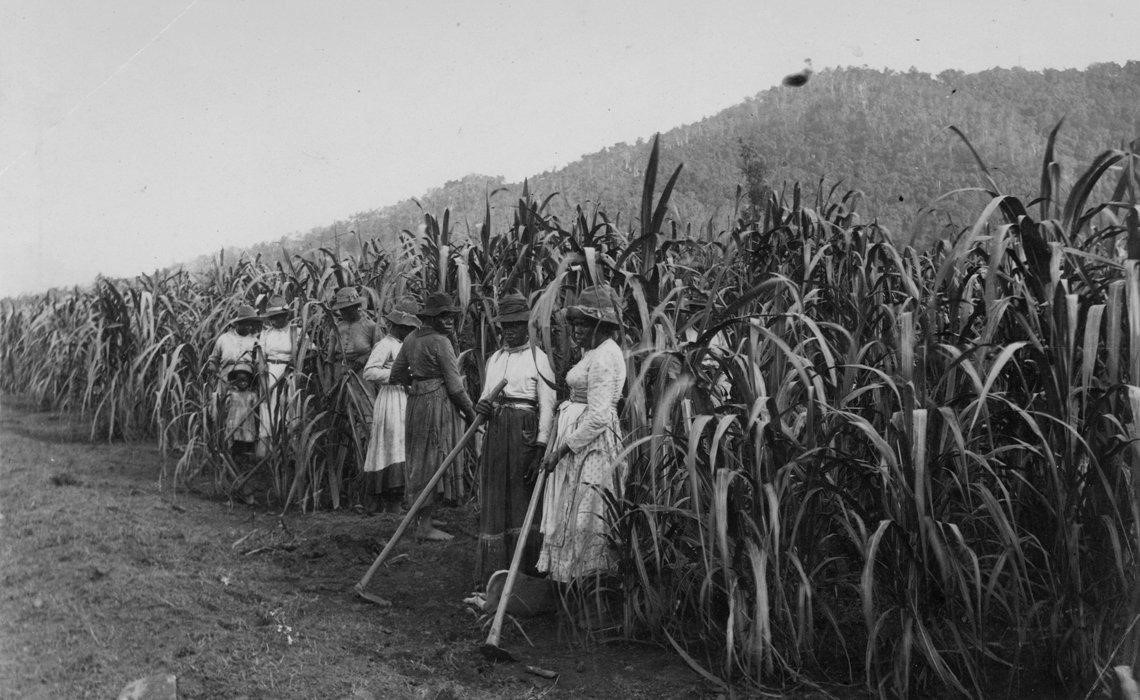
Tuvalu women working in sugar cane fields in Queensland, circa 1890[16]
During the Second World War, large numbers of American troops were stationed on the islands of Tuvalu: air force bases were strategically positioned to allow the Allied forces to attack enemy bases on Kiribati[17]. On Funafuti, the capital and most populous city of the small nation[18] is the site of the drilling carried out by scientists to prove Darwin’s theory on the formation of atolls. Evidence of submerged volcanoes was found after drilling more than 1,000 feet deep[19].
In the 1950s and 1960s, thousands of defenceless islanders were exposed to radioactive fallout, and still suffer the effects of radiation from nuclear tests conducted by the US, UK and France[20]. Nations that still avoid compensating the Pacific population, which has an increasing number of cancers and congenital malformations[21]. In 1976 the islands were separated from the Gilberts, which became the State of Kiribati, gaining independence as Tuvalu in 1978[22], after more than eighty years of British colonial rule[23]. Today it is the fourth smallest country in the world[24]. 98% of the population is Protestant[25].
Tuvalu is one of those dream islands in the South Pacific where, in principle, we would all like to retreat from the world or spend a holiday. It has some of the most pristine beaches on the planet, without the typical crowds and noise of places conquered by mass tourism. It is still possible to observe flying fish gliding through the water from the shore.
Coconuts are a staple of Tuvalu’s traditional cuisine, in addition to eating fish found in the oceans. Traditional dishes include pulaka (made with bananas, coconut and bread), coconut crab and pork[26]. An oasis far away, then – but an oasis in danger of disappearing.
The geophysical and meteorological situation
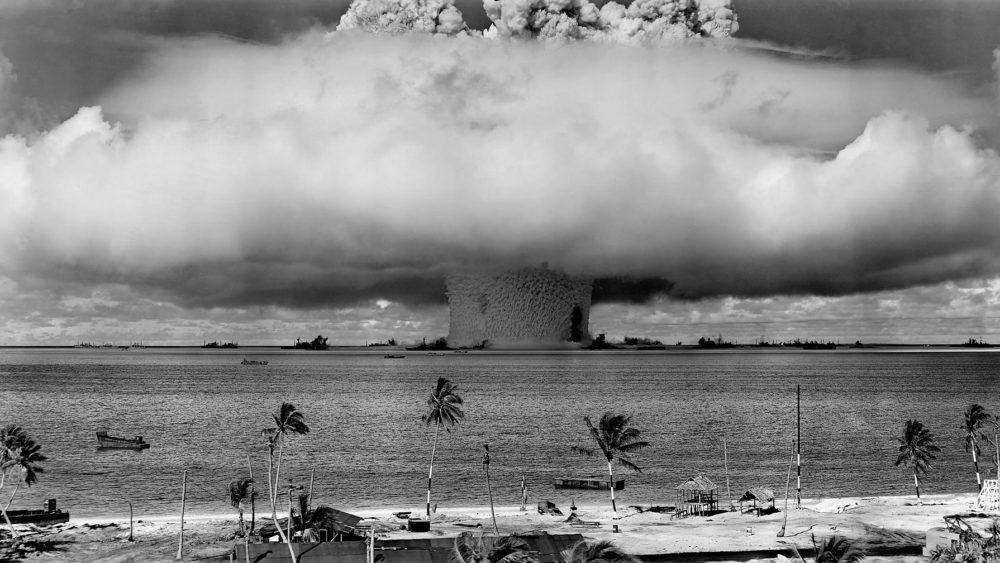
One of hundreds of nuclear tests carried out in the Pacific Ocean[27]
Tuvalu is recognised by scientists as one of the most climate-vulnerable states on the planet. Its islands, which have an area of only 26 square kilometres and a population of about 11,600, have an average height above sea level of less than 3 metres[28]. More than half of the inhabitants live on a single island, Fongafale, on the eastern edge of the Funafuti atoll[29].
In countries like Tuvalu, where ‘people live on thin strips of sand and can see the lagoon on one side and the ocean on the other’, the effects of rising temperatures and the ocean are extreme[30]. Not only is Tuvalu threatened by rising sea levels, but it also faces extreme exposure to hurricanes[31]: they used to hit the area rarely, even every 15 years, now they appear a couple of times a season, and the rains they bring cause temporary flooding, a sign of darker days to come[32].
The climate is tropical, with year-round high temperatures (27°C-29°C) and high average annual rainfall (2500-3000 millimetres), the variability of which is high. The tropical hurricane season runs from November to April and the dry season from May to October[33]. Over the past 40 years, average temperatures have increased by about 0.8 degrees. These increases correlate with increases in sea surface temperature[34].
Research has placed a threshold of 35°C (air temperature) on the human body’s ability to regulate temperature, above which even a very short period of exposure can pose serious risks[35]. Climate change will bring global temperatures closer to this ‘danger zone’. Annual heat-related deaths in Australia could increase by 211% by 2030 and 437% by 2050[36]. There is a database with scenarios to accelerate climate change assessments. The new scenarios are called Representative Concentration Pathways (RCP)[37]. The graph shows the warming estimate (RCP8.5), with an average temperature increase of about 1.4°C by 2050 and about 2.9°C by 2090.
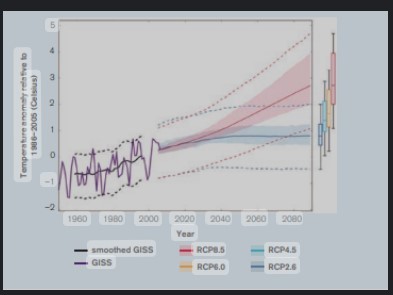
Average temperature increase forecast up to 2090 in Tuvalu[38]
The supply of fresh water depends almost exclusively on rainfall. Available groundwater is often brackish and unsuitable for consumption[39]. As ‘floating islands’ that are not directly connected to the land below, the atolls are located above thin patches of fresh water, which are increasingly impregnated with salt water[40] with the risk of infrastructure damage[41].
Rising sea levels also pose a serious threat to the water security of Pacific countries due to the potential salinisation of drinking water sources. Saline intrusion has been linked to increased hypertension during pregnancy in the Pacific region[42] and may contribute to higher levels of hypertension. But the signs of the catastrophe awaiting Tuvalu are already evident on its slender land. Seawater ponds appear here and there, stretches of beaches are being swallowed up by waves, tree roots are rotting from the ocean[43].
Coral reef die-offs, with warming and acidification, lead to the potential collapse of marine ecosystems that provide food and livelihoods for islanders[44]. This is not just a problem for Tuvalu: many Pacific island nations could become uninhabitable within a few decades. This is particularly unfair given that together they contribute less than 0.03% of the world’s carbon emissions[45].
Tuvalu’s Foreign Minister Kofe said that the competition between superpowers China and the United States to acquire territories is worrying because it diverts attention from climate change. China to increase its presence has made a pact with the Solomon Islands. The US has warned the islands if they allow the construction of Chinese military bases[46]. Nevertheless, China is seeking agreements with the Pacific islands for its vast fishing fleet, another key issue for Tuvalu. Its ships carelessly violate exclusive economic zones and cause environmental damage and economic losses[47].
The tax haven project
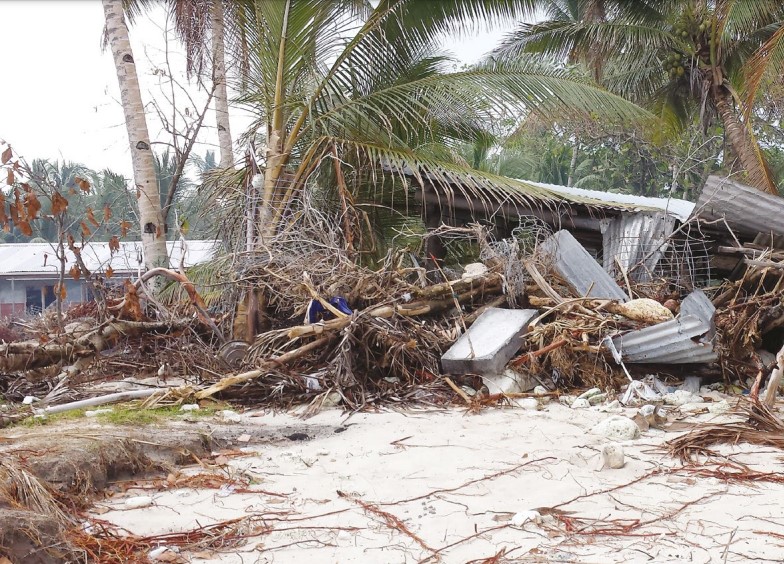
The effects of disastrous hurricanes in Tuvalu[48]
Tuvalu is one of the poorest countries in the world, having a net worth of USD 36 million and an annual per capita income of USD 3048[49]. The economy is sustained by five main pillars: the sale of stamps, the acquisition of the Internet domain ‘.tv’, fishing (which accounts for 50% of the country’s total exports, earning about USD 2 million annually), pig and poultry farming and tourism[50].
Employment opportunities are very limited[51]. According to World Bank data, 26.6% of Tuvalu’s population lived below the national level in 2010[52]. The percentage of jobless and economically inactive people in the public sphere (such as students, pensioners and people working full-time at home) increased from 19% in 2004/5 to 24% in 2010. For this reason, Tuvalu relies heavily on remittances from abroad, other offshore sources of income and foreign aid[53]. The decrease in job opportunities at home is another consequence of climate change. Back in 2011, a New York Times report attributed the decline of Tuvalu’s agricultural industry to increased flooding and soil salinity caused by rising sea levels[54]. So the Tuvaluan government is looking for new ways forward.
Italy, in its 2015 Stability Law, blacklists Tuvalu, considering it a ‘rogue state’ because it protects tax evasion[55]: in 2010, the Tuvalu government, in order to attract foreign capital, becomes an offshore jurisdiction. It establishes the Tuvalu International Business Registry to facilitate the activities of international trading companies and shipping companies[56]. Tuvalu serves as an offshore jurisdiction for international business companies, particularly for the shipping industry[57].
Among the most prominent offshore companies, two, Tuvalu SA[58] and Tuvalu Overseas Limited, to further conceal the identity of their clients, are registered in the British Virgin Islands[59]. Tuvalu SA has UBS Trustees (Bahamas), a subsidiary of the Swiss banking giant UBS, as its intermediary. The Bahamas have themselves been in the crosshairs of tax officials around the world for almost a century. They are still a Caribbean tax haven whose secrecy and tax structures have attracted multinationals and criminals[60]. Tuvalu has also helped circumvent embargoes and oil sanctions on countries like Iran. Few Iranians can find the tiny state on the map or have ever heard of it, but in 2012 out of a fleet of 39 Iranian oil tankers, 15 flew the flag of Tuvalu[61].
Not all the inhabitants of the archipelago are poor. The government helps the lucky ones to transfer their nationality abroad to avoid paying taxes on their business activities. The issue of corruption, in such a small country where everyone knows each other, is rooted deep in the conscience. In 2020, one hundred and forty island residents hold accounts in Australia, whose financial system remains vulnerable to money laundering and tax avoidance, worth USD 112 million, about 200% of Tuvalu’s GDP[62].
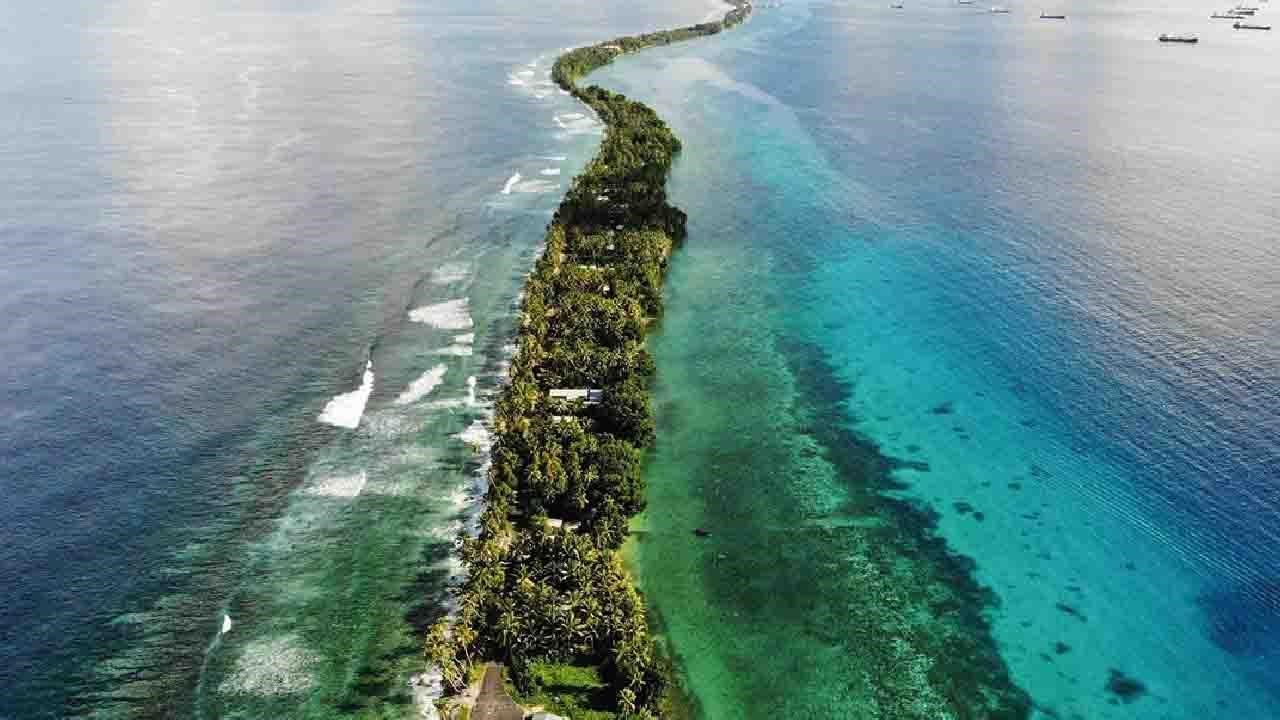
Tuvalu’s thin strip of sand[63]
But the government’s calculations are wrong: they do not take into account the fact that, within the large family of jurisdictions offering themselves as tax havens, this small state is the latest arrival, and in the Pacific Ocean there are already countries (first of all New Zealand, but then Samoa, Niue[64] , and the Marshall Islands, under Chinese and American influence, have already gone so far as to prepare their own cryptocurrency untraceable by magistrates around the world[65].
So, until 1999, Tuvalu remained the third poorest state in the world – until an Internet deal made it rich overnight[66]. Tuvalu receives an Internet domain code, which is none other than ‘.tv’[67]. Its casual resemblance to the abbreviation of ‘television’, however, makes it an unexpected economic advantage; today, Tuvalu earns about 10% of its gross annual income by licensing the domain to technology companies[68].
In 2000, a Californian communications company[69], whose board of directors includes the former Prime Minister of Tuvalu, Koloa Talake[70], bought the domain for the bargain price of USD 40 million. For Tuvaluans, this is a life-changing sum. The islanders became rich. This sudden windfall was accompanied, almost simultaneously, by the news that global warming would soon submerge the islands.
If you suddenly get a windfall, how do you spend it? And if you know that your world, as you know it, is about to disappear, what do you do with the time you have left? For us Westerners these are theoretical questions, good for a chat at the bar, but for the people of Tuvalu they are the questions that matter. Tuvaluans with their earnings have built new roads and discos. In defiance of rising waters, they erect buildings, nightclubs, restaurants and hotels.
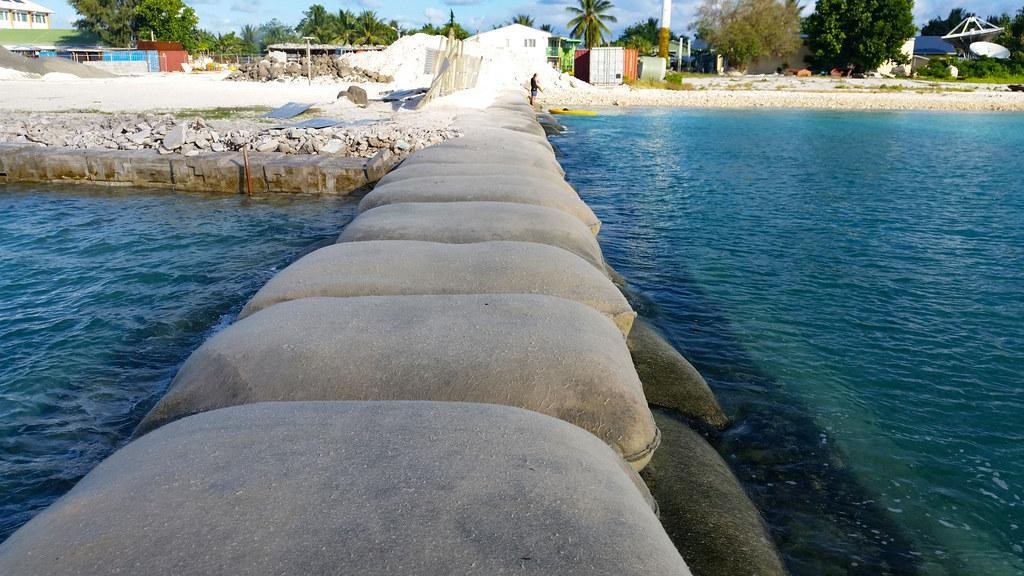
Coral sand bags are used to protect against rising seas[71]
Newly purchased cars drive on newly marked roads. Residents don’t think this is strange: ‘Just because we are sinking doesn’t mean we don’t want to improve our living standards,’ said the Minister of Natural Resources of Tuvalu. Of the USD 40 million raised through the Internet Agreement, USD 10 million was used to pave the island’s 19 km of roads. Before 1999 there were four cars on the islands. Tuvaluans went everywhere on foot or by bicycle. When the money arrived, Tuvalu was invaded by cars and motorbikes[72].
Buying a car is a slow and complicated process, with buyers often having to go through banks or other financial institutions. In 2014, the government of Tuvalu created a Bitcoin Company[73] to replace the national currency with a virtual token[74]. Thanks to these measures, bitcoin’s low transaction fees and high levels of security and privacy favour the people of Tuvalu when buying cars[75].
The Minister of Natural Resources, in charge of paving the roads, owns one of only two petrol stations on the main island. The motor revolution accompanied a wave of other imported food and goods and had an unexpected consequence. Many Tuvaluans, having given up daily exercise, have become obese, hypertensive and diabetic. Others have discovered that the maintenance of their new vehicles is far beyond their means and that luxury itself is not at all necessary in a state of only 26 km². A huge area in the centre of the tropical paradise is now covered with abandoned cars and other rubbish.
From where to get the money needed to solve the problem? The idea: from international aid. For a while, large sums of money were spent in an attempt to raise international awareness of the situation in Tuvalu. Tuvalu joined the United Nations, at a cost of $1.5 million per year. In diplomatic terms, membership is not that expensive, but the rent of an office and secretarial services in New York is[76].

20 September 2022: Marshall Islands President David Kabua speaks about the Pacific climate catastrophe at the 77th session of the UN General Assembly[77]
Another politically audacious idea to raise revenue was put forward by former Prime Minister Koloa Talake: he proposed to sue in an international court the world’s two biggest polluters: the United States and Australia, respectively the world’s largest producers and largest per capita producers of greenhouse gases, the only developed countries that refused to ratify the 1997 Kyoto Protocol for causing the global warming that is leading to the destruction of Tuvalu[78].
The population of the United States is only 5% of the world’s population, yet it is almost single-handedly causing global warming and the loss of the polar ice caps, resulting in rising sea levels, devastating many populations whose lifestyles and industries contribute almost nothing to global warming, particularly small islands[79].
Talake says he hoped that his lawsuits would bring Tuvalu ‘several million dollars for the damages caused by the emissions’[80]. Such a bold venture would have turned Tuvalu into an icon for green organisations around the world – but Talake’s initiative was stifled not by international opposition, but by Tuvaluans themselves, who voted him out of office. The prevailing public sentiment was that Tuvalu cannot afford the kind of legal representation needed to take on giants like the United States and Australia in a court of law. Today, even paradise has a price[81].
In recent years, Tuvalu has seen a growing phenomenon of migration from the outer islands to the main one: the capital Funafuti. The atoll has become increasingly urbanised over the past 25 years and is under heavy population pressure. The 2012 census found that 57% of the country’s population lives on Funafuti, up from 47% in 2002[82]. Furthermore, UN research estimates that about 15% of Tuvalu’s population left the country between 2005 and 2015. People are considering emigrating, but many do not have the financial resources to do so[83].
What to do?
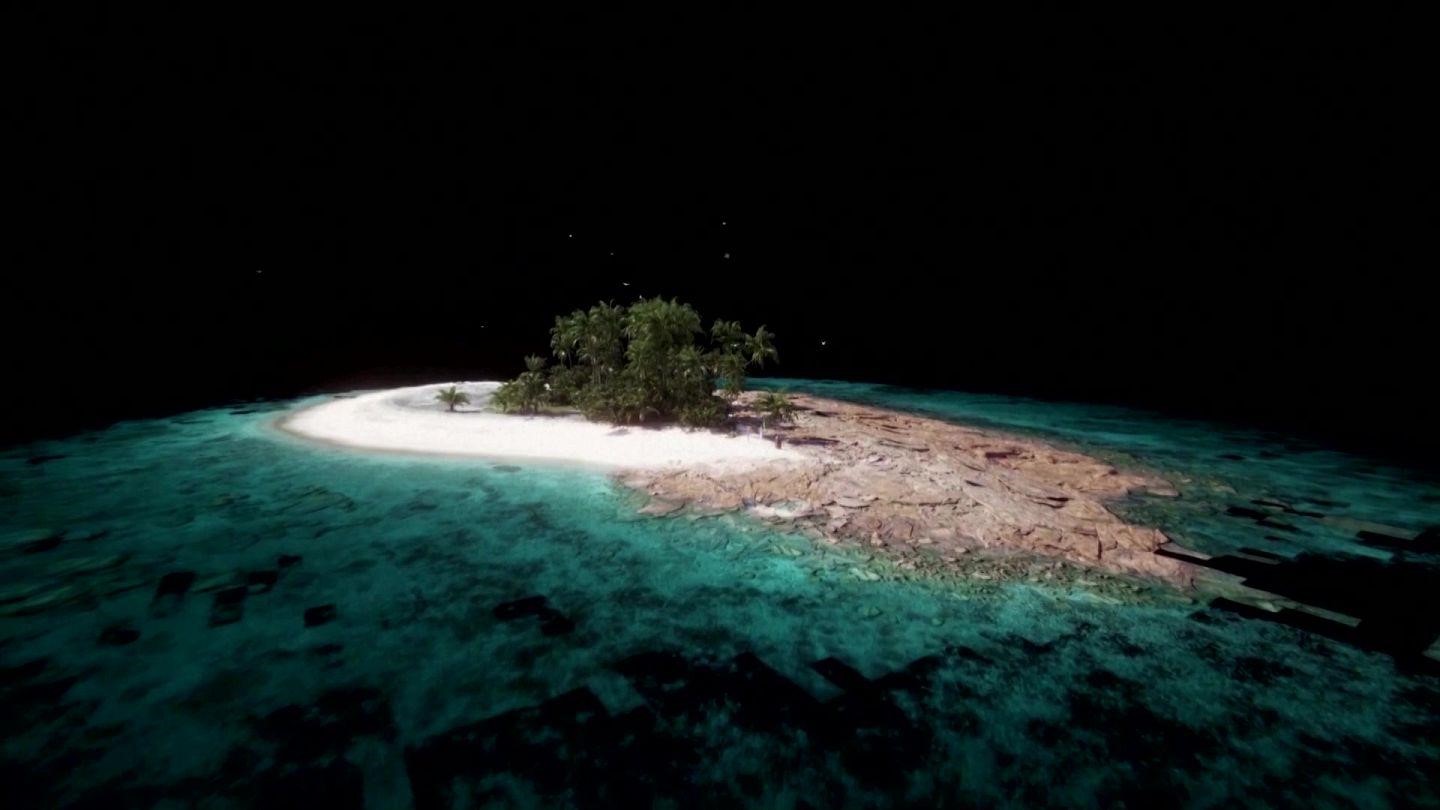
The first virtual reproduction of a Tuvalu island in the metaverse[84]
In order to uphold the country’s right to survival, Foreign Minister Kofe declared at the COP 27 climate summit that the time has come to consider alternative solutions. He announced plans to create a digital clone of the small state, recreating islands and monuments and preserving its history. Tuvalu thus becomes the first digitised nation in the metaverse, an online realm that uses augmented and virtual reality (VR) to help users interact. “Our land, our ocean, our culture are our people’s most precious assets and we will move them to the cloud to protect them from harm, no matter what happens in the physical world”[85].
The adoption of a virtual infrastructure not only offers Tuvalu a chance to survive beyond the ravages of climate change, but can also help the small country to show its weight as a technological innovator on the international stage[86]. Tuvalu has been forced to act because countries around the world are not doing enough to avoid climate change, Kofe explained. Tuvalu will be the first country to replicate, followed by Seoul and Barbados, which announced last year that they will join the virtual realm to provide administrative and consular services respectively. “The goal is to continue to function as a state while also preserving our culture, knowledge and history in a digital arena,” said Kofe[87].
Tuvalu is like a canary in the coal mine. It is a warning that Tuvalu’s fate will also be our fate if we do not change[88]. Global warming could create ‘ghost states’ with governments in exile leading scattered citizens and abandoned lands to rising seas. Experts say it is a matter of time before sea levels rise by a metre or two – which would force the permanent evacuation of islands like Tuvalu. Climate change could in the future force a billion people around the world to migrate[89].
The prosperity of Tuvalu’s population depends on effective climate change management[90]. Since the 1980s, the country has made repeated attempts to build infrastructure to protect against disasters, but have failed to provide adequate and lasting defence[91]. Investments in protection cost much less than reconstruction after a disaster[92]. In 2015, Tuvalu signed and ratified the Paris Agreement and the NDC, the National Determined Contribution[93]. This document summarises the climate risks facing Tuvalu. These include the rapid onset and long-term changes in key climate parameters, as well as the impacts of these changes on communities, livelihoods and economies[94].
The allure of catastrophe
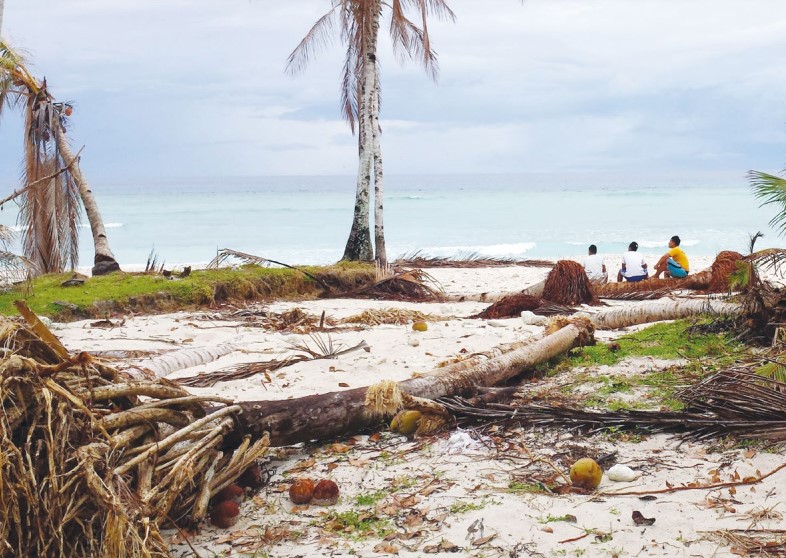
Resigned inhabitants watch the slow rise of the sea[95]
Journalists are fascinated by countries like Tuvalu, Kiribati and the Maldives, because they are catastrophe stories of a hitherto unknown scale. These postcard paradises have become posters of a planetary crisis, with their inhabitants chosen as the world’s first climate refugees[96]. “Tuvalu sinks today, the rest of us tomorrow?”[97] is a typical headline. The islanders proposed to their former governor-general, Iakoba Taeia Italeli[98] , to become Secretary-General of the Commonwealth, so as to increase his power in pursuit of an international platform on climate change.
Indeed, the Commonwealth ‘failed to speak with one voice’ at COP26, cries Italeli. Despite the fact that its members include 32 of the world’s 42 smallest states, all of which are heavily affected by climate change[99]. The President of the Marshall Islands, Kabua, together with the leaders of Tuvalu and Kiribati, intends to launch the Rising Nations Initiative to call for innovative efforts among Pacific Island countries to combat climate change[100] with tough measures on fossil fuels, including aviation and shipping, and a decision to phase out coal as an energy source by 2030[101].
Tuvalu is a metaphor for our planet. Its poor environmental performance is no more striking than that of most other countries. But because it is fragile, remote, resource-poor and low, Tuvalu has less room for error: the consequences, and the future, come sooner. And with greater force[102]. When disaster strikes, the inhabitants will have to leave the islands. Mass immigration to the neighbouring island of Kioa, populated by expatriates, is out of the question, given its refusal to absorb other newcomers. Australia is less than enthusiastic about letting Tuvaluans in, while New Zealand agrees to absorb them on the basis of an annual quota. The hope of retaining a sense of belonging to a single community, after the sinking, is zero[103].
But how real is the threat? Are island nations like Tuvalu, where most of the land is just above sea level, destined to sink beneath the waves, like Atlantis? Not necessarily, according to a growing body of evidence gathered by New Zealand geomorphologist Paul Kench[104] , of the School of Environment at the University of Auckland, and colleagues in Australia and Fiji, who have studied how coral islands in the Pacific and Indian Oceans respond to rising sea levels[105].
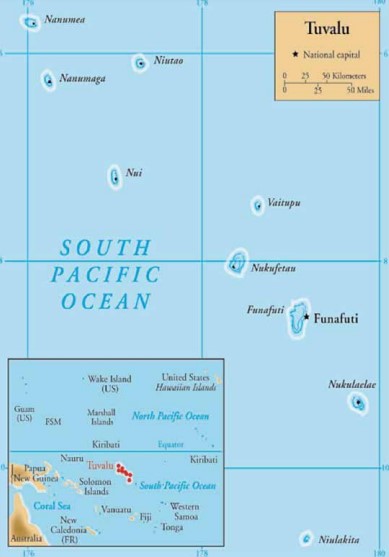
Location of the Tuvalu Atoll in the South Pacific[106]
Kench and colleagues[107] found no evidence of intensified erosion. After examining more than a century of data, including old maps and aerial and satellite images, they concluded that 18 out of 29 islands studied had actually grown[108]. Overall, the group grew by more than 18 hectares, while many islands changed shape, or moved laterally[109]. Tuvalu’s main atoll, Funafuti, 33 islands distributed around the edge of a large lagoon, has gained 75 acres (32 hectares) of land in the last 115 years[110].
“There is still considerable speculation that the islands will disappear as sea levels rise,” says Kench. “Our data indicate that the future of the islands is very different,” and “at the moment there is no evidence that these islands are going to sink,” says Virginie Duvat[111] of the University of La Rochelle in France. She, along with other researchers, is trying to combat the widespread idea that rising sea levels will mean the end for the atolls[112]. Is this a ploy to get millionaire subsidies or to abandon islands where there is no chance of making a profit?
Some critics have labelled the island leaders as opportunists seeking foreign subsidies and special recognition for aspiring ‘environmental refugees’. They say they are exploiting the crisis to gain entry to New Zealand and Australia. Others have even claimed that people and organisations sympathetic to Tuvalu are ‘eco-imperialists’ intent on imposing their alarmist environmentalist views on the rest of the world[113]. The truth, as always, lies somewhere in between. The truth is that we do not know for sure what will happen, but it would be better if we took the necessary precautions to avoid the fascinating catastrophe of having a new Atlantis.
The substance does not change. The inhabitants of Tuvalu have no desire to leave. One of their proverbs, addressed to young people who leave their villages for the bright lights of foreign shores, says: ‘Your climbing rope is waiting for you. No matter how long you are away from Tuvalu, the islands will bring you back. You will resume your place in the community, you will climb coconut palms again. Just like the reef islands, which erode, but are reborn over time[114].
[1] https://www.france24.com/en/live-news/20220921-as-tiny-tuvalu-sinks-pm-fights-to-save-the-archipelago-s-identity
[2] https://ukcop26.org/it/perche-ospitiamo-il-vertice/che-cose-la-cop/
[3] https://www.theguardian.com/environment/2022/nov/05/20-climate-photographs-that-changed-the-world
[4] https://www.linkedin.com/in/simon-kofe-71752435/?originalSubdomain=tv
[5] https://www.theguardian.com/environment/2022/nov/05/20-climate-photographs-that-changed-the-world
[6] https://www.reuters.com/world/asia-pacific/tuvalu-sinking-pacific-fears-becoming-superpower-pawn-2022-05-13/
[7] https://climateknowledgeportal.worldbank.org/sites/default/files/2021-06/15824-WB_Tuvalu%20Country%20Profile-WEB.pdf pag. 2
[8] https://savingtuvalu.org/explore/
[9] https://www.theguardian.com/money/2005/feb/19/scamsandfraud.jobsandmoney
[10] https://sbnri.com/blog/travel/why-tuvalu-is-an-incredible-travel-destination
[11] https://www.everyculture.com/To-Z/Tuvalu.html
[12] https://www.worldtravelguide.net/guides/oceania/tuvalu/history-language-culture/
[13] https://theconversation.com/from-the-caribbean-to-queensland-re-examining-australias-blackbirding-past-and-its-roots-in-the-global-slave-trade-158530
[14] https://www.worldtravelguide.net/guides/oceania/tuvalu/history-language-culture/
[15] https://www.themonthly.com.au/issue/2019/july/1561989600/alex-mckinnon/blackbirds-australia-s-hidden-slave-trade-history#mtr
[16] https://www.themonthly.com.au/issue/2019/july/1561989600/alex-mckinnon/blackbirds-australia-s-hidden-slave-trade-history#mtr
[17] https://www.timelesstuvalu.com/tour-item/history-and-archaeology/
[18] https://www.turismo.it/oltreconfine/scheda/funafuti/
[19] https://www.timelesstuvalu.com/tour-item/history-and-archaeology/
[20] https://hibakusha-worldwide.org/en/locations/kiritimati-and-malden
[21] https://diem25.org/death-paradise-the-aftermath-nuclear-testing-australia-and-oceania/
[22] https://www.worldtravelguide.net/guides/oceania/tuvalu/history-language-culture/
[23] https://taxmoneyhavens.com/2010/09/06/the-tuvalu-international-business-corporation-very-competitive/
[24] https://www.discovermagazine.com/environment/can-the-blockchain-give-this-island-nation-threatened-by-climate-change-a
[25] https://www.worldtravelguide.net/guides/oceania/tuvalu/history-language-culture/
[26] https://sbnri.com/blog/travel/why-tuvalu-is-an-incredible-travel-destination
[27] https://diem25.org/death-paradise-the-aftermath-nuclear-testing-australia-and-oceania/
[28] https://climateknowledgeportal.worldbank.org/sites/default/files/2021-06/15824-WB_Tuvalu%20Country%20Profile-WEB.pdf pag. 2-4
[29] https://www.nationalgeographic.com/science/article/150213-tuvalu-sopoaga-kench-kiribati-maldives-cyclone-marshall-islands
[30] https://www.theguardian.com/environment/2022/nov/05/20-climate-photographs-that-changed-the-world
[31] https://wires.onlinelibrary.wiley.com/doi/abs/10.1002/wcc.371
[32] https://www.theguardian.com/theguardian/2005/mar/04/features11.g21
[33] https://climateknowledgeportal.worldbank.org/sites/default/files/2021-06/15824-WB_Tuvalu%20Country%20Profile-WEB.pdf pag. 2-4
[34] https://www.carbonbrief.org/mapped-how-every-part-of-the-world-has-warmed-and-could-continue-to-warm/
[35] https://www.science.org/doi/10.1126/sciadv.1603322
[36] https://pubmed.ncbi.nlm.nih.gov/23928946/
[37] https://previous.iiasa.ac.at/web/home/research/researchPrograms/TransitionstoNewTechnologies/RCP.en.html
[38] https://climateknowledgeportal.worldbank.org/sites/default/files/2021-06/15824-WB_Tuvalu%20Country%20Profile-WEB.pdf pag.8
[39] https://pubmed.ncbi.nlm.nih.gov/21486720/
[40] https://www.france24.com/en/live-news/20220921-as-tiny-tuvalu-sinks-pm-fights-to-save-the-archipelago-s-identity
[41] https://www.france24.com/en/live-news/20220921-as-tiny-tuvalu-sinks-pm-fights-to-save-the-archipelago-s-identity
[42] https://pubmed.ncbi.nlm.nih.gov/21486720/
[43] https://www.theguardian.com/theguardian/2005/mar/04/features11.g21
[44] https://www.nationalgeographic.com/science/article/150213-tuvalu-sopoaga-kench-kiribati-maldives-cyclone-marshall-islands
[45] https://apnews.com/article/united-nations-general-assembly-marshall-islands-trending-news-climate-and-environment-8f6ed006ae238d349899a30c5835d346
[46] https://www.reuters.com/world/asia-pacific/us-seeks-increase-security-cooperation-with-papua-new-guinea-2022-04-26/
[47] https://www.reuters.com/world/asia-pacific/us-announce-plans-battle-illegal-fishing-pacific-2022-05-09/
[48] https://collections.unu.edu/eserv/UNU:5856/Online_No_18_Tuvalu_Report_161207_.pdf pag. 70
[49] https://www.imf.org/en/Countries/TUV
[50] https://savingtuvalu.org/explore/
[51] https://www.discovermagazine.com/environment/can-the-blockchain-give-this-island-nation-threatened-by-climate-change-a
[52] https://www.adb.org/sites/default/files/linked-documents/cobp-tuv-2017-2019-ld-02.pdf pag. 24
[53] Milan, A., Oakes, R., and Campbell, J. (2016). Tuvalu: Climate change and migration –Relationships between household vulnerability, human mobility and climate change Report No.18. Bonn: United Nations University Institute for Environment and Human Security (UNU-EHS). URL: https://collections.unu.edu/eserv/UNU:5856/Online_No_18_Tuvalu_Report_161207_.pdf
[54] https://www.discovermagazine.com/environment/can-the-blockchain-give-this-island-nation-threatened-by-climate-change-a
[55] https://ww2.gazzettaamministrativa.it/opencms/opencms/_gazzetta_amministrativa/_aree_tematiche/sett_3_europa_coop_internaz/2016/aprile/1460126064312_corruzione_e_riciclaggio_nellxambiente_giuridico-economico_globale.pdf pag. 4
[56] https://taxmoneyhavens.com/2010/09/06/the-tuvalu-international-business-corporation-very-competitive/
[57] https://polpred.com/?ns=1&ns_id=244733
[58] https://offshoreleaks.icij.org/nodes/20085304
[59] https://offshoreleaks.icij.org/nodes/145077
[60] https://www.icij.org/investigations/offshore/former-eu-official-among-politicians-named-new-leak-offshore-files-bahamas/
[61] https://www.bbc.com/news/world-middle-east-18640746
[62] https://taxtechnical.com.au/tax-haven-residents-hold-5-7-billion-of-cash-in-australia-marshal-islands-residents-5m-average-next-biggest-1m-in-bvi/
[63] https://www.commonwealthunion.com/as-tiny-tuvalu-sinks-pm-fights-to-save-the-archipelagos-identity/
[64] https://www.abc.net.au/pacific/programs/pacificbeat/niue,-samoa-money-laundering-history-looms-large/7298164
[65] https://www.bloomberg.com/news/features/2018-12-14/what-happened-when-the-marshall-islands-bet-on-crypto ; https://www.theguardian.com/world/2022/sep/08/call-investigation-marshall-islands-chinese-couple-alleged-plot-mini-state
[66] https://www.theguardian.com/theguardian/2005/mar/04/features11.g21
[67] https://www.smithsonianmag.com/science-nature/will-tuvalu-disappear-beneath-the-sea-180940704/
[68] https://www.discovermagazine.com/environment/can-the-blockchain-give-this-island-nation-threatened-by-climate-change-a
[69] https://www.smithsonianmag.com/science-nature/will-tuvalu-disappear-beneath-the-sea-180940704/
[70] https://billiongraves.com/grave/Hon-Koloa-Fineaso-Talake/5342055
[71] https://www.flickr.com/photos/undpclimatechangeadaptation/52387515720
[72] https://www.theguardian.com/theguardian/2005/mar/04/features11.g21
[73] https://www.entrepreneurshiplife.com/what-consequence-will-bitcoin-have-on-tuvalus-car-industry/
[74] https://www.discovermagazine.com/environment/can-the-blockchain-give-this-island-nation-threatened-by-climate-change-a
[75] https://www.entrepreneurshiplife.com/what-consequence-will-bitcoin-have-on-tuvalus-car-industry/
[76] https://www.theguardian.com/theguardian/2005/mar/04/features11.g21
[77] https://apnews.com/article/united-nations-general-assembly-drowning-island-nations-75f5390daf98d1d385da7dd4a869ae09
[78] https://www.smithsonianmag.com/science-nature/will-tuvalu-disappear-beneath-the-sea-180940704/
[79] https://www.laprogressive.com/racism/tuvalu-as-metaphor-for-black-america
[80] https://www.smithsonianmag.com/science-nature/will-tuvalu-disappear-beneath-the-sea-180940704/
[81] https://www.theguardian.com/theguardian/2005/mar/04/features11.g21
[82] https://www.adb.org/sites/default/files/linked-documents/cobp-tuv-2017-2019-ld-02.pdf pag. 61
[83] https://climateknowledgeportal.worldbank.org/sites/default/files/2021-06/15824-WB_Tuvalu%20Country%20Profile-WEB.pdf pag. 2
[84] https://www.euronews.com/next/2022/11/23/tuvalu-is-recreating-itself-in-the-metaverse-as-climate-change-threatens-to-wipe-it-off-th
[85] https://www.commonwealthunion.com/why-is-this-pacific-island-replicating-itself-in-the-metaverse/
[86] https://www.discovermagazine.com/environment/can-the-blockchain-give-this-island-nation-threatened-by-climate-change-a
[87] https://www.commonwealthunion.com/why-is-this-pacific-island-replicating-itself-in-the-metaverse/
[88] https://www.laprogressive.com/racism/tuvalu-as-metaphor-for-black-america
[89] https://www.theguardian.com/environment/2009/sep/29/sea-levels-ghost-states
[90] https://www.preventionweb.net/files/68527_tuvalunationalclimatepolicy.pdf
[91] https://climateknowledgeportal.worldbank.org/sites/default/files/2021-06/15824-WB_Tuvalu%20Country%20Profile-WEB.pdf pag. 3
[92] https://climateknowledgeportal.worldbank.org/sites/default/files/2021-06/15824-WB_Tuvalu%20Country%20Profile-WEB.pdf pag. 19
[93] https://unfccc.int/NDCREG
[94] https://climateknowledgeportal.worldbank.org/sites/default/files/2021-06/15824-WB_Tuvalu%20Country%20Profile-WEB.pdf pag. 3
[95] https://collections.unu.edu/eserv/UNU:5856/Online_No_18_Tuvalu_Report_161207_.pdf pag 16
[96] https://www.nationalgeographic.com/science/article/150213-tuvalu-sopoaga-kench-kiribati-maldives-cyclone-marshall-islands
[97] https://www.latimes.com/archives/la-xpm-2002-feb-18-oe-reichert18-story.html
[98] https://iakobaitaleli.gov.tv/
[99] https://www.reuters.com/world/asia-pacific/tuvalu-sinking-pacific-fears-becoming-superpower-pawn-2022-05-13/
[100] https://apnews.com/article/united-nations-general-assembly-marshall-islands-trending-news-climate-and-environment-8f6ed006ae238d349899a30c5835d346
[101] https://apnews.com/article/united-nations-general-assembly-drowning-island-nations-75f5390daf98d1d385da7dd4a869ae09
[102] https://www.smithsonianmag.com/science-nature/will-tuvalu-disappear-beneath-the-sea-180940704/
[103] https://www.theguardian.com/theguardian/2005/mar/04/features11.g21
[104] https://fass.nus.edu.sg/geog/people/paul-kench/
[105] https://www.nationalgeographic.com/science/article/150213-tuvalu-sopoaga-kench-kiribati-maldives-cyclone-marshall-islands
[106] https://www.adb.org/sites/default/files/linked-documents/cobp-tuv-2017-2019-ld-02.pdf pag.V
[107] https://pubs.geoscienceworld.org/gsa/geology/article-abstract/43/6/515/131899/Coral-islands-defy-sea-level-rise-over-the-past?redirectedFrom=fulltext
[108] https://pubs.geoscienceworld.org/gsa/geology/article-abstract/43/6/515/131899/Coral-islands-defy-sea-level-rise-over-the-past?redirectedFrom=fulltext
[109] https://www.newscientist.com/article/dn27639-small-atoll-islands-may-grow-not-sink-as-sea-levels-rise/?ignored=irrelevant#.VX4fFGB3uCQ
[110] https://www.nationalgeographic.com/science/article/150213-tuvalu-sopoaga-kench-kiribati-maldives-cyclone-marshall-islands
[111] https://lienss.univ-larochelle.fr/Duvat-Magnan-Virginie-Pr1
[112] https://www.newscientist.com/article/dn27639-small-atoll-islands-may-grow-not-sink-as-sea-levels-rise/?ignored=irrelevant#.VX4fFGB3uCQ
[113] https://www.smithsonianmag.com/science-nature/will-tuvalu-disappear-beneath-the-sea-180940704/
[114] https://www.nationalgeographic.com/science/article/150213-tuvalu-sopoaga-kench-kiribati-maldives-cyclone-marshall-islands
Leave a Reply